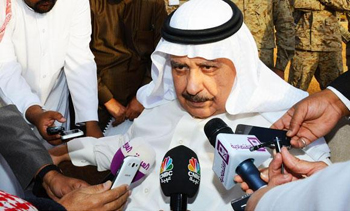
Jeddah, Jan 16: The General Authority of Civil Aviation will build three new airports in Jazan, Abha and Arar this year as part of efforts to meet the demand of growing passenger traffic.
This has been revealed by Prince Fahd bin Abdullah, president of GACA.
Speaking to reporters after inspecting progress of work at King Khaled International Airport (KKIA) in Riyadh, he said 50 percent of work on the new terminal (No. 5) had been completed.
“The new terminal can handle 12 million passengers annually,” the prince said, adding that it covers 100,000 square meters.
“Once the ongoing expansion is completed, the KKIA will be able to handle a total of 36 million passengers annually, three times more than the current capacity,” the GACA chief said.
He said the second phase of the expansion project would further increase the KKIA’s capacity to 47.5 million passengers. Prince Fahd also spoke about efforts to privatize major international airports, beginning from the KKIA.
Speaking about the operation of domestic service by new private airlines, he said they needed to complete certain procedures, required in any developed country.
Efforts are under way to expand the capacity of Terminal 3 and 4 of the KKIA to 18 million passengers with 23 gates. These terminals will serve 38 aircraft of varying sizes.
They will also have 130 passenger counters and 30 for self-service, 36 immigration counters, six e-gates and a baggage zone with 10 belts.
The Terminal No. 5 will have eight dual air bridges to board 16 aircraft at a time.
It will have 60 passenger counters, 20 self-service counters, 28 immigration counters and 30 immigration counters for arrivals.




Comments
Add new comment